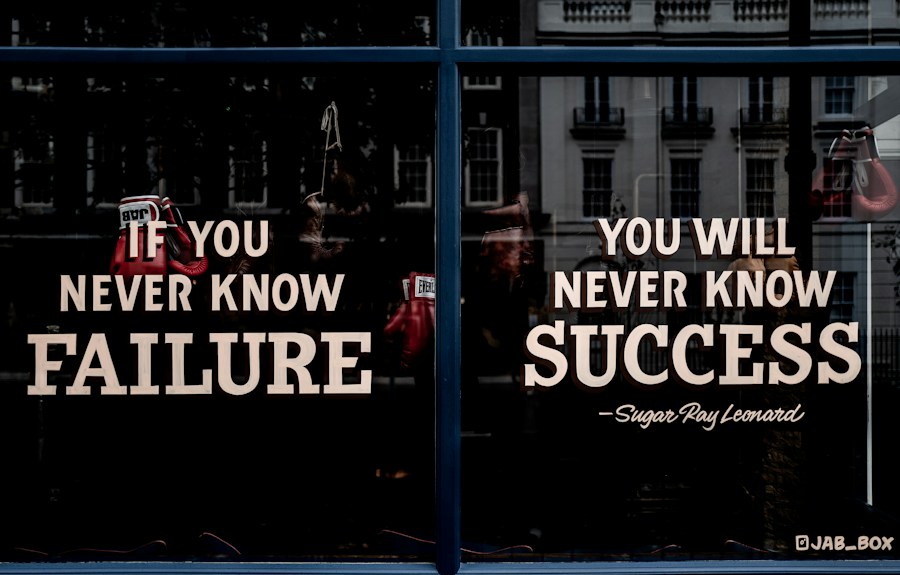The concept of growth mindset, popularized by psychologist Carol Dweck, refers to the belief that abilities and intelligence can be developed through effort, practice, and learning. It is the belief that one’s talents and abilities are not fixed traits but rather can be improved upon and developed over time. This mindset is in contrast to a fixed mindset, which is the belief that abilities and intelligence are innate and cannot be changed.
Having a growth mindset is crucial for lifelong learning and personal development because it allows individuals to embrace challenges, persist in the face of setbacks, and continuously strive for improvement. When individuals believe that their abilities can be developed, they are more likely to put in the effort and practice needed to achieve their goals. They are also more likely to view failures and setbacks as opportunities for learning and growth rather than as indicators of their inherent limitations.
Fixed Mindset vs. Growth Mindset: What’s the Difference?
A fixed mindset is characterized by the belief that abilities and intelligence are fixed traits that cannot be changed. Individuals with a fixed mindset tend to avoid challenges because they fear failure and view it as a reflection of their lack of ability. They also tend to give up easily when faced with obstacles or setbacks because they believe that their abilities are limited.
On the other hand, a growth mindset is characterized by the belief that abilities and intelligence can be developed through effort, practice, and learning. Individuals with a growth mindset embrace challenges because they see them as opportunities for growth and improvement. They also persist in the face of setbacks and view failures as learning experiences rather than as indicators of their limitations.
Examples of a fixed mindset in action include a student who avoids taking on challenging assignments because they fear failure, or an employee who gives up on a project after encountering difficulties because they believe they lack the necessary skills. Examples of a growth mindset in action include a student who seeks out challenging tasks to improve their skills or an employee who views setbacks as opportunities to learn and grow.
The Science Behind Growth Mindset: How the Brain Learns
The concept of a growth mindset is supported by scientific research on neuroplasticity, which is the brain’s ability to change and adapt. The brain is not a fixed organ but rather a dynamic and malleable structure that can be shaped through experience and learning. When individuals engage in effortful learning and practice, new neural connections are formed in the brain, allowing for the development of new skills and abilities.
Effort and practice play a crucial role in developing skills because they strengthen the neural connections associated with those skills. When individuals put in the effort to learn and practice, they are essentially rewiring their brains to become more proficient in a particular area. This process of neural rewiring is what allows individuals to improve their abilities over time.
The impact of mindset on brain function is also supported by research. Studies have shown that individuals with a growth mindset have increased activity in the areas of the brain associated with learning and memory, while those with a fixed mindset have decreased activity in these areas. This suggests that mindset can influence how the brain processes information and learns new skills.
The Benefits of Embracing a Growth Mindset in Learning
Embracing a growth mindset has numerous benefits for learning and personal development. One of the key benefits is increased motivation and engagement. When individuals believe that their abilities can be developed, they are more likely to be motivated to put in the effort and practice needed to achieve their goals. They are also more likely to be engaged in the learning process because they see it as an opportunity for growth and improvement.
Another benefit of embracing a growth mindset is improved performance and achievement. When individuals believe that their abilities can be developed, they are more likely to set high goals for themselves and work towards achieving them. They are also more likely to persist in the face of setbacks and view failures as opportunities for learning and growth. This mindset of continuous improvement and resilience leads to higher levels of performance and achievement.
In addition, embracing a growth mindset also leads to greater resilience and adaptability. When individuals believe that their abilities can be developed, they are more likely to bounce back from setbacks and adapt to new challenges. They are less likely to be discouraged by failures and setbacks because they see them as temporary obstacles that can be overcome with effort and learning.
Overcoming Obstacles: How a Growth Mindset Helps You Persist
Persistence is a key factor in achieving goals and overcoming obstacles. It is the ability to keep going even when faced with difficulties or setbacks. Embracing a growth mindset is crucial for developing persistence because it allows individuals to view setbacks as temporary and solvable problems rather than as indicators of their limitations.
One of the key factors in developing persistence is the belief that effort leads to improvement. When individuals believe that their abilities can be developed through effort, they are more likely to persist in the face of challenges. They see setbacks as opportunities for learning and growth rather than as indications of their lack of ability.
Strategies for overcoming setbacks and challenges include reframing negative thoughts, seeking support from others, and breaking tasks down into smaller, more manageable steps. Reframing negative thoughts involves challenging negative self-talk and replacing it with more positive and empowering thoughts. Seeking support from others can provide encouragement and guidance during difficult times. Breaking tasks down into smaller steps can make them feel more achievable and less overwhelming.
Developing grit and resilience is also closely tied to mindset. Grit refers to the ability to persevere in the face of challenges and setbacks. It is the ability to maintain focus and determination over long periods of time. Embracing a growth mindset is crucial for developing grit because it allows individuals to view challenges as opportunities for growth and improvement rather than as insurmountable obstacles.
Cultivating a Growth Mindset: Strategies for Developing a Positive Mindset
Cultivating a growth mindset involves developing a positive and empowering mindset that allows for continuous learning and growth. There are several strategies that can help individuals develop a growth mindset.
One strategy is mindfulness and self-awareness. Mindfulness involves being present in the moment and aware of one’s thoughts and feelings. It allows individuals to observe their thoughts and emotions without judgment, which can help them identify and challenge negative or limiting beliefs. Self-awareness involves being aware of one’s strengths, weaknesses, and areas for improvement. It allows individuals to take ownership of their learning and growth.
Another strategy is positive self-talk and reframing negative thoughts. Positive self-talk involves replacing negative or limiting thoughts with more positive and empowering ones. It can involve using affirmations or positive statements to counteract negative self-talk. Reframing negative thoughts involves challenging negative beliefs and replacing them with more positive and empowering ones. It can involve asking oneself questions such as “What can I learn from this?” or “How can I grow from this experience?”
Embracing challenges and seeking out new experiences is another strategy for developing a growth mindset. Embracing challenges involves stepping outside of one’s comfort zone and taking on tasks or activities that are challenging but achievable. It allows individuals to develop new skills and abilities through effort and practice. Seeking out new experiences involves actively seeking opportunities for learning and growth, whether it be through taking on new projects at work or pursuing hobbies or interests outside of one’s comfort zone.
The Role of Failure in Growth Mindset: Learning from Mistakes
Failure is often seen as something to be avoided or feared, but in reality, it is an essential part of the learning process. Embracing failure as a learning opportunity is a key aspect of developing a growth mindset.
Failure provides valuable feedback and information about what does not work, which can guide individuals towards finding what does work. It allows individuals to learn from their mistakes and make adjustments for future success. Failure also builds resilience and perseverance, as individuals learn to bounce back from setbacks and keep going despite obstacles.
Strategies for reframing failure and avoiding a fixed mindset include focusing on the process rather than the outcome, celebrating effort and progress, and seeking feedback and guidance from others. Focusing on the process involves valuing the effort and learning that go into a task rather than solely focusing on the end result. Celebrating effort and progress involves recognizing and acknowledging the hard work and growth that occur along the way, regardless of the outcome. Seeking feedback and guidance from others can provide valuable insights and perspectives that can help individuals learn from their mistakes and improve.
Examples of successful people who have failed and learned from their mistakes include Thomas Edison, who famously said, “I have not failed. I’ve just found 10,000 ways that won’t work,” in reference to his numerous attempts to invent the light bulb. Another example is J.K. Rowling, who faced multiple rejections before her Harry Potter series was published. Both of these individuals embraced failure as a learning opportunity and persisted in the face of setbacks, ultimately achieving great success.
The Importance of Feedback in Growth Mindset: Embracing Constructive Criticism
Feedback plays a crucial role in personal and professional growth. It provides individuals with valuable information about their strengths and areas for improvement, allowing them to make adjustments and continue to grow.
Embracing feedback requires having a growth mindset because it involves being open to learning and growth. Individuals with a growth mindset see feedback as an opportunity for improvement rather than as a personal attack or criticism. They view feedback as valuable information that can help them develop their skills and abilities.
Strategies for receiving feedback effectively include being open-minded and non-defensive, asking for clarification or examples, and seeking feedback from multiple sources. Being open-minded and non-defensive involves listening to feedback with an open mind and without becoming defensive or argumentative. Asking for clarification or examples can help individuals better understand the feedback and how they can apply it to their growth. Seeking feedback from multiple sources can provide a more well-rounded perspective and help individuals identify patterns or areas for improvement.
The impact of mindset on how we respond to feedback is also important to consider. Individuals with a growth mindset are more likely to view feedback as an opportunity for growth and improvement, while those with a fixed mindset may view it as a personal attack or criticism. This difference in mindset can greatly influence how individuals respond to feedback and whether they are able to use it constructively for their growth.
Growth Mindset in the Workplace: How It Can Improve Your Career
Embracing a growth mindset in the workplace can have numerous benefits for one’s career. One of the key benefits is increased motivation and engagement. When individuals believe that their abilities can be developed, they are more likely to be motivated to put in the effort and practice needed to excel in their roles. They are also more likely to be engaged in their work because they see it as an opportunity for growth and improvement.
Another benefit of a growth mindset in the workplace is improved performance and achievement. When individuals believe that their abilities can be developed, they are more likely to set high goals for themselves and work towards achieving them. They are also more likely to persist in the face of setbacks and view failures as opportunities for learning and growth. This mindset of continuous improvement and resilience leads to higher levels of performance and achievement.
In addition, embracing a growth mindset in the workplace also leads to greater resilience and adaptability. When individuals believe that their abilities can be developed, they are more likely to bounce back from setbacks and adapt to new challenges. They are less likely to be discouraged by failures and setbacks because they see them as temporary obstacles that can be overcome with effort and learning.
Examples of companies that prioritize a growth mindset in their culture include Google, which encourages employees to take risks and learn from failures, and Microsoft, which promotes a growth mindset through its performance management system. These companies recognize the importance of a growth mindset in fostering innovation, creativity, and continuous learning.
Growth Mindset in Education: How It Can Help Students Succeed
Embracing a growth mindset in education is crucial for student success. The impact of mindset on academic achievement has been well documented, with research showing that students with a growth mindset outperform those with a fixed mindset.
One of the key ways in which a growth mindset promotes student success is through increased motivation and engagement. When students believe that their abilities can be developed, they are more likely to be motivated to put in the effort and practice needed to excel academically. They are also more likely to be engaged in their learning because they see it as an opportunity for growth and improvement.
Another way in which a growth mindset promotes student success is through improved performance and achievement. When students believe that their abilities can be developed, they are more likely to set high goals for themselves and work towards achieving them. They are also more likely to persist in the face of setbacks and view failures as opportunities for learning and growth. This mindset of continuous improvement and resilience leads to higher levels of performance and achievement.
Strategies for promoting a growth mindset in the classroom include providing explicit instruction on the concept of a growth mindset, praising effort and progress rather than intelligence or talent, and providing opportunities for reflection and self-assessment. Providing explicit instruction on the concept of growth mindset involves teaching students about the brain’s ability to change and the importance of effort and practice in developing skills. Praise for effort and progress involves recognizing and acknowledging the hard work and growth that students demonstrate, rather than solely focusing on their intelligence or talent. Providing opportunities for reflection and self-assessment allows students to reflect on their learning and set goals for improvement.
Examples of schools and educators who prioritize growth mindset in their teaching include High Tech High, a network of schools that emphasizes project-based learning and the development of a growth mindset, and Ron Clark Academy, a school in Atlanta that promotes a growth mindset through its rigorous academic program and focus on character development.
Embracing the Power of Growth Mindset for Lifelong Learning
In conclusion, embracing a growth mindset is crucial for personal and professional development. It allows individuals to embrace challenges, persist in the face of setbacks, and continuously strive for improvement. By believing that abilities and intelligence can be developed through effort, practice, and learning, individuals are more likely to put in the effort needed to achieve their goals and view failures as opportunities for growth.
Strategies for cultivating a growth mindset include mindfulness and self-awareness, positive self-talk and reframing negative thoughts, embracing challenges, and seeking out new experiences. Embracing failure as a learning opportunity and embracing feedback are also important aspects of developing a growth mindset.
Embracing a growth mindset has numerous benefits, including increased motivation and engagement, improved performance and achievement, greater resilience and adaptability, and increased career success. It also has a significant impact on academic achievement, with students who embrace a growth mindset outperforming those with a fixed mindset.
By continuing to cultivate a growth mindset throughout life, individuals can unlock their full potential and achieve greater success. A growth mindset is the belief that abilities and intelligence can be developed through dedication, effort, and perseverance. It allows individuals to embrace challenges, learn from failures, and persist in the face of setbacks. By maintaining a growth mindset, individuals are more likely to take risks, seek out new opportunities for growth, and continuously improve themselves. This mindset fosters a love for learning and a desire to constantly push boundaries, leading to personal and professional growth. Additionally, a growth mindset enables individuals to overcome obstacles and adapt to changing circumstances, making them more resilient and better equipped to navigate the complexities of life. Ultimately, by embracing a growth mindset, individuals can continuously evolve and achieve their goals, leading to a fulfilling and successful life.








































0 Comments